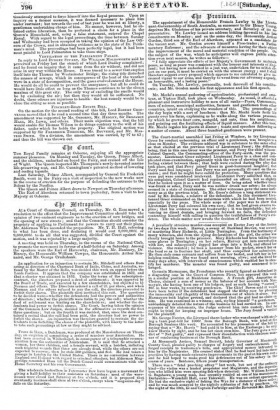i4t 311rtrnpulio.
At a Court of Common Council, on Thursday, Mr. G. Ross moved a resolution to the effect that the Improvement Committee should take the opinion of two eminent engineers as to the erection of new bridges, and the opening of new streets ; and that the Committee should consider the propriety of applying to Parliament for powers to carry out their plans. Mr. Alderman Wire seconded the proposition. Mr. T. H. Hall, referring to what has been done, and declaring it would cost 8,000,0001. or 9,000,0001. to do all that was suggested, divided the Court against the motion, and it was rejected by a large majority.
A meeting was held on Thursday, in the rooms of the National Club, to promote the movement in favour of a half-holiday on Saturday. Among the speakers were the Earl of Harrowby, chairman, Mr. Hanbury, Dr. Binney, the Honourable William Cowper, the Honourable Arthur Sin- naird, and Mr. George Cruikshank.
An application for an injunction to restrain Mr. Mitchell and others from acting as directors of the Chartered Bank of India, China, and Australia, re- fused by the Master of the Rolls, was decided this week on appeal before the Lords Justices. It appears that the company was established in 1852, and that a charter was obtained in 1853. Under the terms of the subscription- contract, the directors prepared a deed of settlement ; it was approved by the Board of Trade, and executed by a few shareholders, but objected to by Norman and others. The Directors ordered a call of 21. per share, and when Norman and the others refused to pay the call, the directors proceeded to forfeit their shares. The plaintiffs then instituted this suit. The questions to be decided were—whether the defendants had the powers and authorities of directors ; whether the plaintiffs were liable to pay the call ; whether the deed of settlement was binding on the shareholders; and whether the de- fendants had power to forfeit shares. The Court, having taken the opinion of the Common Law Judges, decided in the affirmative as regards the first three questions ; but on the fourth it was decided, that, since the deed con- tained a recital that the call had been paid, the directors had no power to forfeit the shares. An injunction was therefore granted to restrain the de- fendants from forfeiting the shares of the plaintiffs, with liberty to the latter to take such proceedings at law as they might be advised.
Franz de Tim, a Dutchman, was produced at the Mansionbouse on Thurs- day, on suspicion of committing a series of murders near Amsterdam. He had been arrested in Whitechapel, in consequence of a telegraphic commu- nication from the authorities of Amsterdam. It is said that he attacked a woman, her three children, and a female servant, with a hatchet, inflicting such frightful wounds that three are already dead, while the others are not expected to recover ; then he stole 500 guilders, and fled. He had taken a
England in London for the United States. There is no convention between England and Holland with regard to criminal offenders, but Alderman Mug- gendge remanded Haas till the Dutch Consul could communicate with our Home Secretary and his own Government.
The wholesale booksellers in Paternoster Row have begun a movement for giving a half-holiday to their assistants on Saturdays : most of the ware- houses were closed last Saturday at five o'clock, and it is proposed that eventually business shall close at two o'clock, except when "magazine-day" falls on the Saturday.


































 Previous page
Previous page